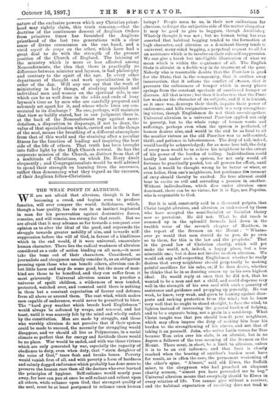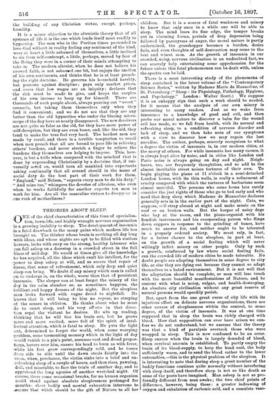THE WEAK POINT IN ALTRUISM.
WE are not afraid that altruism, though it is fast becoming a creed, and begins even to produce fanatics, will ever conquer the world. Selfishness, which, though a base quality, has its root in an instinct implanted in man for his preservation against destructive forces, remains, and will remain, too strong for that result. But we are afraid that it may advance so far towards a conquest over opinion as to alter the ideal of the good, and supersede the struggle towards greater nobility of aim, and towards self- suppression before the will of God, in favour of a kindliness which in the end would, if it were universal, emasculate human character. There lies the radical weakness of altruism considered as a code of action binding on all men,—it must take the bone out of their characters. Considered, as journalists and clergymen usually consider it, as an obligation pressing upon those who can benefit others, altruism can do but little harm and may do some good, but the mass of man- kind are those to be benefited, and they can suffer from it most grievously. Universal altruism means in practice a universe of spoilt children, a wilderness of men tended, protected, watched over, and cosseted until there is nothing in them but a constant expectation of favour and defence from all above or around them. The east wind, which makes men capable of endurance, would never be permitted to blow. The "hard grey weather which breeds hard Englishmen" would always be softened by wraps, and sea-coal, and hot toast, until it was scarcely felt by the mind and wholly unfelt by the constitution. Men are made by struggle, and these who worship altruism do not perceive that if their system could be made to succeed, the necessity for struggling would disappear, and we should all live as Polynesians, in a social climate so perfect that for energy and fortitude there would be no place. War would be ended, and with war those virtues which are only generated by war, especially the capacity of obedience to duty, even when duty, that "stern daughter of the voice of God," tears flesh and breaks bones. Poverty would vanish first of all, and with poverty a form of hardness and calmly dogged endurance which probably has done more to preserve the human race than all the doctors who ever learned the principles of hygiene. Self-reliance would nearly pass away, for how can you at once be self-reliant and reliant upon all others, while reliance upon God, that strongest quality of the soul, must be at least postponed to reliance upon human beings ? People seem to us, in their new enthusiasm for altruism, to forget the subjective side of the matter altogether It may be good to give to beggars, though Archbishor Whately thought it was not ; but no human being has eve, asserted that habitual begging tended to the formation of high character, and altruism as a dominant theory tends tc universal, many-sided begging, a perpetual request to all fox an assistance which is to involve on their side self-suppression. We can give a harsh but intelligible illustration of what we mean which is within the cognisance of all. The English State is altruist in a feeble way in its trearment of the poor; Nobody who is reasonable doubts that the Poor-law is gootc for the State, that is, the community, that it soothes away insurrection, that it softens the conflict of einsses, that it prevents the callousness of temper which in many places springs from the constant spectacle of unrelieved hunger or distress. All that is true ; but then it is also true that the Poor- law weakens the character of its subjects, and if it is lenient, as it once was, destroys their thrift, impairs their power of endurance, and kills resignation—which is a very strengthen- ing virtue, though Englishmen do not think so—altogether. Universal altruism is a universal Poor-law applied not only to poverty, but to the whole range of human wants and sufferings, perhaps even when the system is perfected, of human desires also, and would in the end be as fatal to all the manlier virtues as the old Poor-law was to self-control, thrift, and patience in laboriousness. The duty of toil, indeed, would hardly be acknowledged; for as none love toil, the duty of every man would be to relieve his neighbour to the extent of his power of the burden of toiling. Individualism could hardly last under such a system, for not only would all fortunes be practically pooled, but all powers for effort, until at last it would be thought wrong to be better or wiser, or even holier, than one's neighbours, lest perchance the torment of envy should thereby be excited. No true altruist could bear to excite so evil and corroding a passion in another. Without individualism, which dies under altruism once dominant, there can be no virtue, for it is Ego, not Populus, who is responsible to God.
But it is said, constantly said in a thousand pulpits, that Christ taught altruism, and altruism as understood by those who have accepted the semi-Socialist or Socialist theory now so prevalent. He did not. What be did teach is summed up in the splendid formula laid down in the twelfth verse of the seventh chapter of Matthew, in the report of the Sermon on the Mount : " Whatso- ever ye would that men should do to you, do ye even so to them, for this is the law and the prophets." That is the grand law of Christian charity, which will yet make the world, not, indeed, a happy place, but a less miserable one; but it does not involve modern altruism. We would ask any self-respecting Englishmen whether he really desires that every neighbour should perpetually be making painful sacrifices for his sake, or, if he does desire, whether he thinks that he in so desiring comes up to his own highest ideaL He would reply at once that he did not, that he wanted to be a man and not a child, and could dispense very well in the strength of his own soul with such a quantity of assistance and guidance and propping up generally. He was weak, he knew, very weak, and given to leaning against door- posts and seeking protection from the wind ; but he knew very well that he ought to stand straight, to face the wind, to lighten instead of increasing the general burden of helping, and to be a separate being, not a grain in a sand-heap. What Christ taught was that you should benefit your neighbour, which may often impose the duty of making him bear his burden to the strengthening of his sinews, and not that of taking it on yourself. John, who writes Latin verses for Tom because Tom cries over his slate, is an altruist, but in no degree a follower of the true meaning of the Sermon on the Mount. There must, in short, be a limit to altruism, unless it is to be an evil influence, and that limit is clearly reached when the bearing of another's burden must have for result, as is often the case, the permanent weakening of the other's spine. "Almost," said old Elwes, the Suffolk miser, to the clergyman who had preached an eloquent charity sermon, "almost you have persuaded me to beg.' Universal altruism means that everybody should be Elwes in every relation of life. You cannot give without a receiver, and the habitual expectation of receiving does not tend to
the building of any Christian virtue, except, perhaps, humility.
It is a minor objection to the altruistic theory that of all systems of life it is the one which lends itself most readily to hypocrisy. The men who in the Puritan times pretended to love God without in reality feeling any sentiment of the kind, were at heart a little ashamed of themselves, a little inclined to sin from self-contempt, a little, perhaps, moved by fear of the Being they were in a corner of their minds attempting to take in. The modern altruist, when he does not believe his avowed faith, is not ashamed one bit, but enjoys the unction of his own sentiments, and thinks that be is at least preach- ing the right doctrine. He governs his household harshly, but protests against discipline ; pays only market prices, and avers that low wages are an iniquity ; declares that the rich must be made to give, and keeps the surplus of his own income to heap up for himself. There are thousands of such people about, always pouring out " sweet " counsels, but taking them themselves only when they 'End it convenient; and we do not see that they are any better than the old hypocrites who under the blazing micro- -scope of the day have so nearly disappeared. The new deceivers are not quite so false as the old, for they have more power of self-deception, but they are even baser, and, like the old, they tend to make the true feel very hard. The hardest men are made by recoil, and there is a terrible temptation to recoil when men preach that all are bound to pass life in relieving others' burdens, and never stretch a finger to relieve the burdens they themselves are helping to impose. This, how- ever, is but a trifle when compared with the mischief that is • done by superseding Christianity by a doctrine that, if uni- versally acted on, would turn all mankind into expectants asking continually that all around should in the name of social duty do the best part of their work for them. .''England," said Nelson, "expects every man to do his duty." "And mine too," whimpers the devotee of altruism, who even when he works faithfully for another expects ten men to work for him. Are all the masculine virtues to disappear in one rush of motherliness







































 Previous page
Previous page